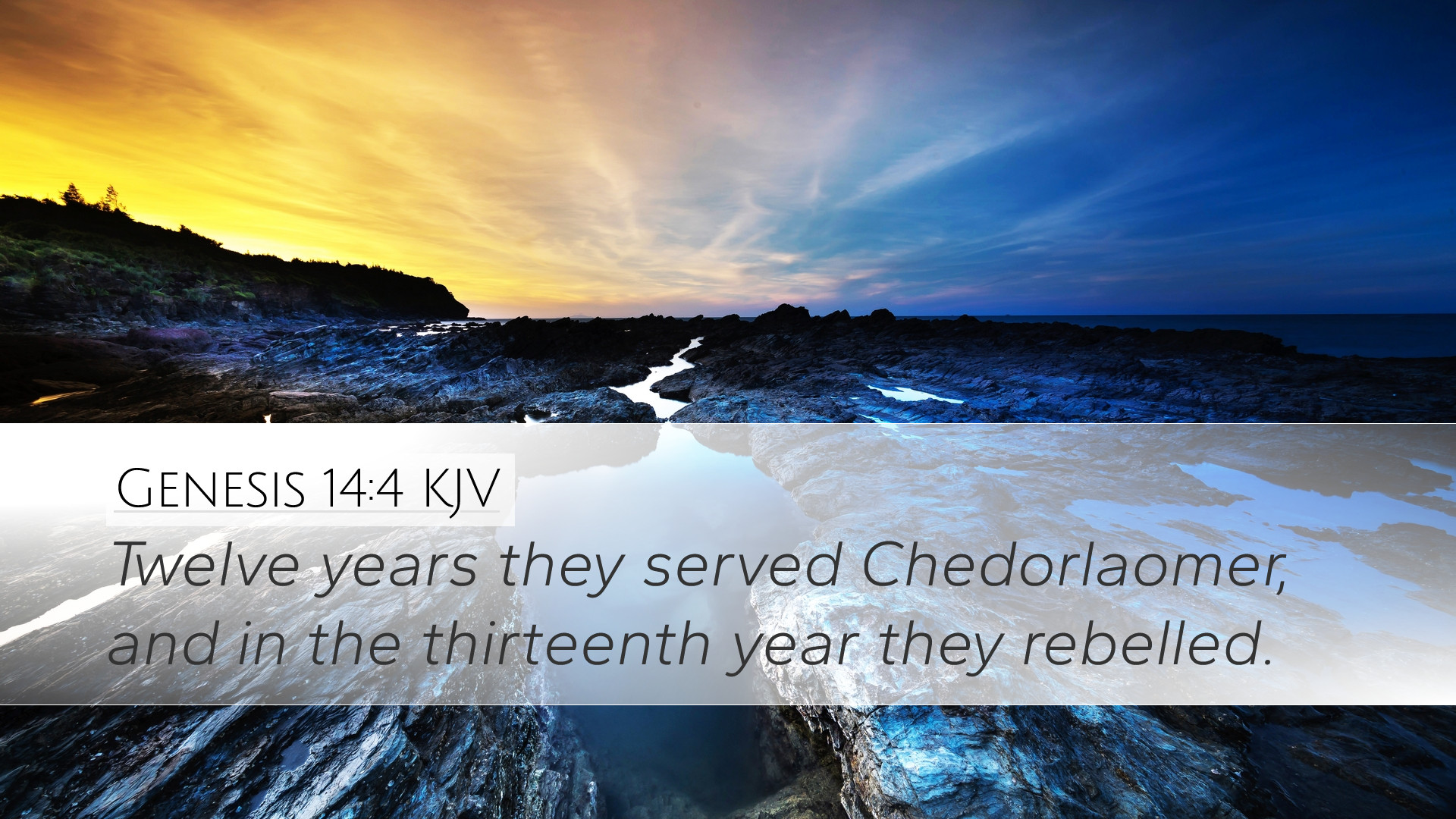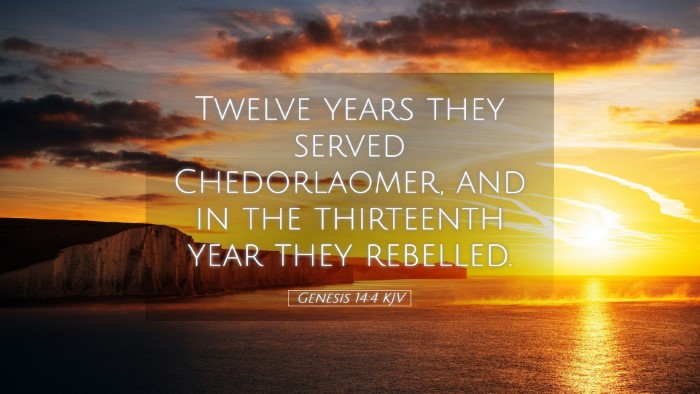Commentary on Genesis 14:4
Verse: Genesis 14:4 - "Twelve years they served Chedorlaomer, and in the thirteenth year they rebelled."
The context of Genesis 14 is critical for understanding the significance of this particular verse. It introduces the broader narrative of conflict, allegiance, and divine intervention that characterizes the early stories of the Patriarchs.
Historical Context
Genesis 14 recounts an important episode in the life of Abraham (Abram). It describes a coalition of kings led by Chedorlaomer, king of Elam, who subdued a number of neighboring kings in the region including the kings of Sodom and Gomorrah. The reference to a twelve-year period of servitude establishes the oppressive reality faced by the conquered leaders, indicating both political and military dominance on the part of Chedorlaomer.
Insight from Matthew Henry
Matthew Henry highlights the theme of rebellion against tyranny evident in Genesis 14:4. He emphasizes that the thirteenth year marks a turning point—where the oppressed kings decided to resist their overlord. This act of rebellion reflects the spirit of liberation and the deep-seated desire for autonomy that resonates throughout biblical history.
Henry further notes the significance of the number twelve, often associated with completeness in the Bible. The twelve years of servitude underscore that the oppression reached a full measure, leading to the climax of rebellion in year thirteen. This serves as a metaphor for the struggle of the righteous against evil throughout the ages.
Albert Barnes’ Perspective
Albert Barnes points out that this verse illustrates how power dynamics can resemble cycles of oppression and rebellion. He articulates that the rulers' servitude to Chedorlaomer was not merely a political necessity but also a theological reflection; it shows how such servitude often led to spiritual consequences.
Barnes interprets the thirteenth year as a significant moment of change, indicating that God allows periods of distress as part of His divine plan. This rebellion, while seemingly a human effort, is framed by a broader divine providence indicating that God may allow oppression but ultimately guides history toward liberation and justice.
Insights from Adam Clarke
Adam Clarke provides a more detailed examination of the geopolitical situation indicated by this verse. He elucidates that the kings of the cities of the plain, including Sodom and Gomorrah, were likely motivated by a desire for self-rule rather than tyranny.
Clarke considers the nature of rebellion itself, suggesting that while it could be viewed as an act of personal liberty, it also comes with consequences. He warns that rebellion without a righteous cause can attract divine judgment—pointing to the ultimate fate of Sodom and Gomorrah that follows later in Genesis.
Theological Implications
This verse encapsulates several important theological principles:
- The Nature of Oppression: Oppression often serves as a backdrop against which God’s deliverance is showcased. This sets the stage for understanding future covenantal promises as they unfold in the narrative of Abraham's descendants.
- Human Autonomy and Divine Sovereignty: The rebellion signifies a fundamental aspect of human nature—the desire for self-governance. Yet, it also shows how human actions are programed within a framework established by God’s sovereignty over history.
- Prophetic Foreshadowing: The rebellion of the kings can foreshadow the future struggles of Israel against foreign powers and their eventual cry to God for help, drawing parallels to later biblical themes of redemption and grace.
- The Role of Faith: In the backdrop of this conflict, the faith of Abraham will be contrasted with the actions driven by fear and self-preservation among the other kings. Faith-based decisions often lead to divine intervention.
Application for Today
For contemporary readers, Genesis 14:4 serves as a reminder of the cyclical nature of power, conflict, and resolution:
- Church and Culture: Just as the kings of the plain faced their oppressor, the modern church must resist cultural pressures that seek to diminish its voice and mission.
- Faith Under Duress: Believers can draw strength from the assurance that rebellion against injustice will yield a greater revelation of God’s sovereignty and justice.
- Reflection on Leadership: Leaders must consider the weight of their authority; unjust governance leads to rebellion and conflict, urging a return to principles of service and righteousness.
- Divine Providence in Rebellion: Even in seasons of upheaval and rebellion, God’s providence is at work, orchestrating events for His overarching purpose and glory.
Conclusion
Genesis 14:4 stands as a significant verse within the broader narrative of Genesis, highlighting issues of servitude, rebellion, and divine providence. Insights from public domain commentaries enrich our understanding of this text, revealing timeless truths that resonate with the human experience of oppression and the desire for freedom.


